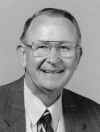A Tribute to Dr. William McKinney
 |
On October 24th, 2003, the neurological world lost one of its most enthusiastic, innovative, and supportive citizens. Dr. William M. McKinney (June 6th, 1930 – October 24th, 2003), best known for his pioneering work in the development and use of ultrasound for neurological disorders and stroke, succumbed to cancer following a prolonged, courageous, and inspiring battle.
A native of Roanoke, VA, Bill did undergraduate studies at Washington and Lee University, and received his degree in Chemistry from the University of North Carolina in 1951. He then served as an Operations Officer on a naval destroyer in Korea, before entering the University of Virginia’s School of Medicine, where he was awarded his M.D. degree in 1959. His internship and residency in Neurology were completed at the University of Virginia, following which he was hired by Dr. James F. Toole, and joined the Department of Neurology at what was then the Bowman Gray School of Medicine in Winston-Salem, NC. He, “Came for two years, and stayed for 34”, and remained at this institution for the duration of his medical career. Bill retired from active clinical practice in 1997, but continued as a Professor Emeritus at what had then become Wake Forest University School of Medicine, the Bowman Gray Campus.
Although his father was a radiologist, Bill chose to approach the brain and nervous system from a clinical perspective, using non-roentgenographic methods; a decision that shaped his entire medical career. While in medical school, he did a research fellowship in urolithiasis with the Department of Physiology. During residency training, his interest in ultrasound technology focused on the emerging method of echoencephalography. Upon arriving in Winston-Salem, his enthusiasm for this technology grew as he found a fertile academic environment and colleagues with whom he could practice what he called “cooperative creativity”. Some of his earliest accomplishments were to help establish the Center for Medical Ultrasound (1963), to organize an educational program for echoencephalography in 1964, and to set up the first neurosonology course in 1975. Dr. McKinney’s most important research contributions involved the use of ultrasound to study the carotid arteries, which he first published about in 1971. Over the years these ultrasonic diagnostic methods have become a standard part of medical practice. He participated in many advancements and innovations in ultrasound including 3-D mapping with continuous wave Doppler, B-mode imaging, duplex ultrasound, color flow imaging, volume flow rate measurements, transcranial Doppler, ultrasound contrast agents, and embolus detection. Bill was the “father” of Neurosonology in the United States, and was credited with first defining the term “Neurosonology”, as the science of the application of ultrasonic energy to study the nervous system and its supporting structures, for diagnosis and treatment. Clinically, this came to mean primarily carotid ultrasound and transcranial Doppler, but he was always postulating new neurological applications of ultrasound for diagnosis and treatment. Through it all, Bill remained focused on the question of how these techniques could help to improve patient care for the “little Aunt Hatties” of the world.
Over the years, Dr. McKinney was recognized by his peers for his accomplishments, receiving the 1981 Caldwell Medal of the American Roentgen Ray Society, and being named as a Distinguished Member of the American Society of Neuroimaging (ASN). He was also awarded Fellowship status in the American College of Radiology, and the American Institute of Ultrasound in Medicine (AIUM). He served as President of the AIUM (1974-76), and the ASN (1990-92), and helped to found the Neurosonology Research Group of the World Federation of Neurology, as well as the North Carolina Stroke Association. He represented the American Academy of Neurology as an original member of the Board of Directors of the Intersocietal Commission for Accreditation of Vascular Laboratories.
More than his creative research, awards, and positions, his enduring legacy in neurosonology will be his passion for education, as he preached the “gospel of ultrasound” all over the world, as evidenced by the lives and accomplishments of the thousands of physicians, sonographers, medical students, residents, and fellows, who he taught and mentored. Bill did not care what specialty hat those in his courses wore, only that they were interested in learning and that they would use ultrasound to help their patients. Most leaders in this field studied, did fellowships, lectured for, or collaborated with Bill McKinney at some time during their careers. The courses and programs he established have endured and grown, now with an international scope. In later years, his interests expanded as he led the development of a rocking chair to improve muscle function and overall well-being in the elderly. He also raised apples on his hilltop orchard in the nearby Brushy Mountains.
Beyond Neurosonology, Bill was the prototype of a caring, compassionate physician, with a deep sense of duty and respect for every patient. He was a true southern gentleman, who treated each person as special. His infectious smile, sense of humor, enthusiasm, and his humility, endeared him to all. He truly had the “gift of gab”, he really loved people, and he never seemed to know a stranger. He was a mentor and role model for hundreds, as he also managed to keep his priorities straight, in spite of the demands of medicine, with God and family having first place in his life. His last scientific project also tapped into his strong faith, as he wrote, “The Christian Brain”, with his wife and colleagues. His advice and counsel was wise, down to earth, based on experience, and was highly valued. He was an active member of the Highland Presbyterian Church, and a long time member of the Rotary. Bill was also a loving husband and father, and he is survived by his wife, Joan, three children, and five grandchildren. Our hearts go out to each of them over their loss.
On a more personal note, Bill McKinney was the reason I came to Winston-Salem. He recruited me for several years to come visit Bowman Gray School of Medicine, before I finally agreed to come and teach for one of his ultrasound courses, and to see what this part of North Carolina, “God’s country” as he called it, had to offer. During the time we shared here, Bill became my most valued colleague, mentor, and friend. For me, like many others, he was a surrogate “father” in medicine. I will forever recall how he greeted so many with a heartfelt, “You’re such a good man”, or his inevitable opening line to conversations of, “I want to discuss three things”. He will certainly be missed. However, he will live on through the lives and careers of those he touched, and the programs he created. He provides an example and an inspiration to urge us onward to find innovative new approaches, and new ways to extend our hands to teach others, while keeping our focus on how what we do can help our patients. It was a real blessing to have known Dr. William M. McKinney, who truly was “such a good man”. -- Charles H. Tegeler, MD


